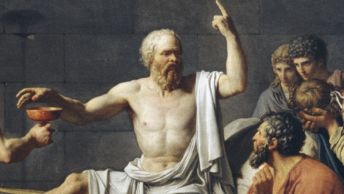In ancient Greece a famous philosopher visited a certain city and began speaking in the public forum. A wealthy man was entertaining friends, and he and his guests heard the philosopher was in their city. As a joke, the host ordered one of his slaves to go to him and “purchase” some philosophy, using a drachma or silver coin. The slave went and said to the philosopher, “My master wishes to purchase a drachma’s worth of philosophy,” and the wise man responded, “In all things look to the end”—in other words, always consider the end results before deciding or doing anything. When the slave returned and repeated this message, the master was so impressed with this wise teaching that he made it his personal motto; he had it inscribed over the entry to his estate, and began living and doing all things according to this philosophy.
Many people throughout history have failed to follow this simple formula for happiness and success, instead acting in a foolish and short-sighted manner that led to much suffering and regret—for themselves and others. This seems to be especially true in our own age. In the 1950s, during the height of the cold war between the United States and the Soviet Union, the U.S. Army developed an artillery shell consisting of a small nuclear device. However, it had a range of only three miles—which meant that if it were ever used, the resulting explosion would also kill the gun crew that fired it. As the book describing this weapon said, “What were they thinking?” We can roll our eyes in disbelief over such stupidity, but people act against their best interests, or even in self-destructive ways, all the time. What about the gunman in Las Vegas who murdered almost 60 people before killing himself: was he thinking there is no afterlife or Divine Judgment? To his eternal regret, he now knows differently. Recently the news broke of an FBI investigation of a widespread scandal involving cheating and recruiting violations in the world of college basketball. Over the last few months there have been numerous stories about corruption, bribes, and payoffs involving former Macomb County (MI) officials and various contractors. For fifteen years now I’ve been upset and ashamed every time I read a report of a priest involved in sexual or financial misconduct. All these things bring to mind an important but often-overlooked teaching of Jesus: “There is nothing hidden that will not become visible, and nothing secret that will not be known and come to light” (Lk. 8:17). I can’t help but wonder, “Did these people actually think they would get away with their sins—that their misdeeds would always stay hidden, and they’d never be held accountable?”
The same idea applies to those who commit adultery, or embezzle money from their employer, or start using cocaine, or look on-line for immoral companionship, or engage in any other type of spiritually or physically dangerous or self-destructive behavior. Too many people don’t stop to consider the likely consequences: shame, psychological harm, crippling guilt, destroyed relationships, ruined reputations, potential prison sentences, and, above all, the very real risk in many cases of eternal damnation. We as a people are seemingly not very good at “looking to the end,” as the ancient philosopher advised—but as Christians, this should be our foremost concern. What decisions and actions will please God and help us one day enter His Kingdom? Jesus is calling us to live by this standard, and only if we try to do so can we be assured of being truly happy and blessed.
What about the renters of the vineyard in Our Lord’s parable (Mt 21:33-43)—did they really think that after beating up or killing the owner’s servants and then murdering his son, he would let them get away with it? We wonder how anyone could be so foolish—but that was Jesus’ point: His enemies would end up being severely punished unless they repented. The Lord tells us through the prophet Isaiah (5:1-7) that He is just, and that He will withdraw His blessings from those who rebel against Him. We must not make this mistake; instead, as St. Paul tells us in his Letter to the Philippians (4:6-9), we must hold onto whatever is true, honorable, just, pure, and gracious—for then the peace of God will be with us.
When I was assigned to a parish in 1990, one summer night around 11:30, I heard the sound of metal falling down. Looking out the window, I saw, despite the dark, two teenagers who had ripped the drain-spout off the side of church and who were carrying it away as if they had all the right in the world to be doing so, making no effort to hide or remain silent. Naturally I immediately called the police, and within ten minutes the thieves were apprehended. I asked myself, “What were they thinking—how could they be so stupid as to believe they would get away with this?” Even if they had waited until 3am, when their odds of going undetected would have been much greater, God would know what they had done, and would have held them accountable. In all things we must look to the end and consider the likely long-term results—and this ultimately refers to the day of our death and our experience of divine judgment.
Jesus wants us to live in a way that allows us to look forward to this day, rather than fearing or dreading it. We need to fix our sight firmly on Heaven—but at the same time, we should always remain aware of the reality of Hell. On the one hand, Our Lord came to proclaim the Good News of salvation, but on the other hand, Jesus spoke much more about Hell and damnation than He did about Heaven and eternal life. In all things we must look to the end, and then choose and act accordingly. For instance, when we’re tempted to say something clever but cruel at someone else’s expense, we should ask ourselves: how will this affect my ongoing relationship with the person? If we have the chance to make some money or get ahead in our career by doing something morally suspect, we need to ask ourselves: what will happen if this becomes known—is it really worth it? If we feel like breaking one of the Ten Commandments or ignoring one of the teachings of the Church, we’d first better consider whether doing so would please or offend God, and whether this choice would bring us closer to Him, or do the opposite.
Many times people are their own worst enemies, making stupid decisions and engaging in foolish and even self-destructive behavior that undermines their own chances for lasting happiness. The Lord is calling us to something better than that, and He offers us the grace we need to choose and act wisely. All our moral decisions have consequences. However, this is very good news if we’ve chosen to follow Jesus; with His help, we can bring forth a rich harvest and live in a way that assures our eternal happiness and peace.








